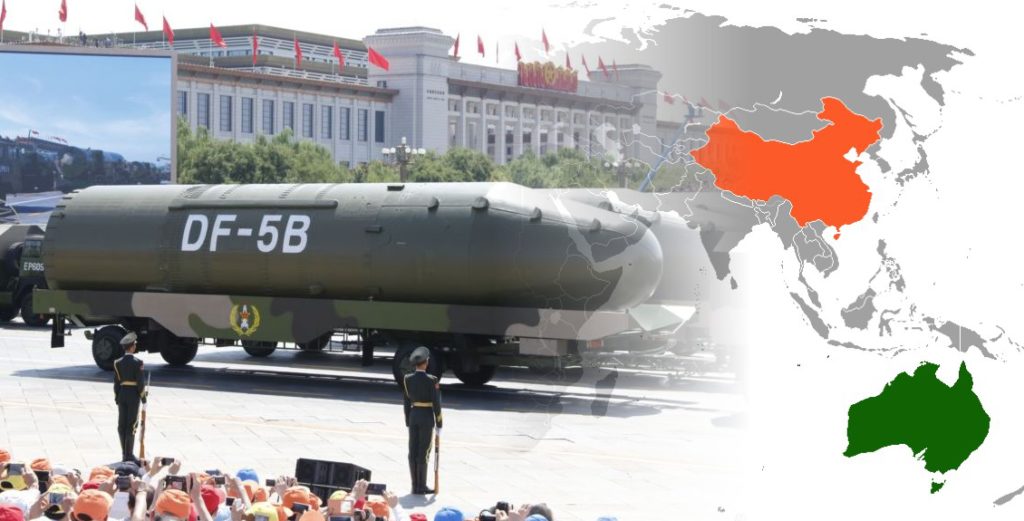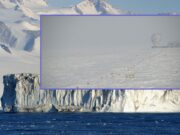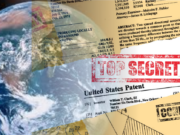
By James O’Neill*
Forty years ago, the government of the People’s Republic of China embarked upon what amounted to a new revolution. They resolved that in order to re-establish their place as a leader in the world they needed to reform their economy. This year, that liberalization and opening up of the economy is celebrated throughout China.
Is has literally transformed China, and not only economically. China’s military and political power has not until now being commensurate with its economic role. What we are witnessing now is a growing political assertiveness, built on that economic dominance; self confidence as to its role in the world; and an overwhelmingly strong determination that never again will China be subject to the “century of humiliation” it suffered from the mid 19th to the mid 20th centuries.
Those of us raised and educated in the western system were rarely exposed to the truth of that century of humiliation. How the British, for example, fought three wars in Afghanistan in the 19th century to ensure control of the opium production that was then used as a means of subjugating China. At the turn of the last century one in seven Chinese adults was addicted to heroin.
Today, the British have been replaced by the Americans as the controllers of Afghanistan’s heroine crop (93% of the worlds supply according to the UNDA) but the policy remains unchanged: a highly lucrative cash crop that subsidizes covert operations and is used as a means of destabilizing unfriendly governments.(McCoy In the Shadows of the American Century; 2017)
That can be seen particularly today in Pakistan, the predominately Muslim nations of the former Soviet Union, and Xinjiang province in China.
The current western “concern” about alleged “re-education camps” in Xinjiang is conspicuous for its complete failure to note any element of this hybrid warfare being waged by the West, not only through heroin, but also the training and arming of terrorist proxies, the so-called Free Turkmenistan Army.
The western reaction to the re-emergence of China can also be traced back many decades. After the American puppet Chiang Kai Shek was defeated in the civil war and fled to what was then called Formosa, American warships controlled the Straits of Taiwan to prevent the Chinese army from pursuing Chiang.
Politically, the People’s Republic of China was denied its rightful place on the United Nations Security Council, many Western nations, including Australia, maintaining the fiction that Taipei was the legitimate holder of that role.
Billy McMahon, surely until the present incumbent Australia’s worst prime minister, attacked Gough Whitlam when the latter went to China with the intention of normalizing relations with the PRC after the 1972 election that Labor was likely to win.
The Americans had omitted to tell McMahon that while he was fulminating about Whitlam’s “treachery”, United States eminence grise, Henry Kissinger, was in fact in Beijing seeking the same normalization. Nixon’s China policy was a major reason for his removal two years later, not the popular mythology of Watergate.
The Korean war, the destruction of the 1954 Vietnam Geneva peace accords, the Vietnam war itself, the bombing of Laos and Cambodia, were all part of that anti-Chinese reaction following the success of the Communist Party in the Civil War. The scaremongering of that era, including the unconstitutional attempt by the Menzies government to make the Communist Party illegal, and the witch-hunts of what we call the McCarthyism era, are a vivid footnote in our recent history.
Until Whitlam, Australia was a willing participant in the anti-China campaign, both rhetorically and also by its participation in both the Korean and Vietnam wars.(Michael Pembroke Korea: Where the American Century Began 2018)
Especially ironic is the current Australian rhetoric against China’s “militarization” of the South China Sea. I have yet to see or hear a word in the Australian mainstream media about the United States’ militarization of China’s borders. There are currently approximately 400 U.S. military bases whose primary strategic objective is the “containment” of China.
These include military bases in the Philippines, Guam, Japan, South Korea, Thailand and Australia. These bases store, inter alia, nuclear, chemical and biological weapons.
Pine Gap is the best known of the Australian bases, but there are many others, including Harold Holt naval base at Exmouth, WA; a communications station at Geraldton WA; the Stirling naval base in Perth WA; Darwin NT and Shoalwater Bay QLD.
Offshore, Cocos Island southwest of Sumatra is an important base. In November 2018 at the APEC conference in Port Moresby, Australia and the United States announced the planned development of a naval base on Manus Island. The views of the Papua New Guinea government, whose territory it actually is, were not reported.
There is also a biennial naval exercise, operation Talisman Sabre that is conducted by United States and Australian forces. The exercise practices blockading the Straits of Malacca, through which 80% of Chinese seaborne exports and imports pass. That Strait is only 2.7km wide at its narrowest point.
The Australian media regularly refer to the Strategic importance of the South China Sea for maritime traffic purposes. They omit to mention that the bulk of that maritime traffic is either going to or coming from China. They are also completely silent on Operation Talisman Sabre. It is not difficult to assume that the Chinese government sees Talisman Sabre as an unfriendly act.
If anyone has a true vested interest in “freedom of navigation” in this region it is the Chinese. Freedom of peaceful navigation is in fact guaranteed under the United Nations Convention on the Law of the Sea, to which China is a signatory and the United States is not.
In addition to the announced intention with regard to Manus Island, Australia is also a putative member of the so-called “Quad” nations, that is, the United States, Japan, India and Australia. This is another grouping overtly aimed at “containing” China.
In practice, it will primarily be an Australian – United States configuration. The Japanese are exhibiting wariness towards the United States, especially with Trump’s trade wars and erratic foreign policy. It is more significant in my view that the Japanese Prime Minister recently made a visit to China, the first visit at such a level for several years, and signed a number of agreements reflecting an increasing degree of co-operation.
Other initiatives included initial steps towards creating a bridge and tunnel link between the Japanese and Russian mainland. This in itself marks a significant development in cooperation between the three Asian giants.
Japan is also now engaged in serious talks with Russia to sign a treaty to formally conclude World War 2. The status of four northern islands is a key issue. The Russians will not agree to the United States having a military base on any of the islands.
India has a difficult relationship with China, mainly over border issues, what it perceives as Chinese encroachment upon India’s traditional sphere of influence, and China’s close relationship with Pakistan, manifested for example in the China Pakistan Economic Corridor. The CPEC in part traverses the politically sensitive Kashmir region.
India has also however, had a long history of non-alignment and has recently strengthened its historic ties to Russia, as with the purchase of Russian jet fighters and the S400 anti ballistic missile system. India continues to purchase Iranian gas. In February of this year, India and Iran signed an agreement for India to have the operating lease for the Iranian port of Chalabar during President Rouhani’s visit to India.
President Modi specifically referred to the “centuries old bilateral relationship” between the two countries.
Presidents Putin and Modi recently signed a series of multibillion-dollar deals. Importantly, these deals were nominated in rupees and rubles, which is part of a rapidly growing development away from the United States dollar.
It is China and Russia’s leadership in this de-dollarization that is one of the main reasons for United States hostility towards both China and Russia.
The quickest and surest way to demolish the United States Empire is to remove the dollar as the main medium of international trade. It is the reserve status of the dollar that has enabled the United States to defy economic logic over the past 50 years. The transition away from the dollar is in my view likely to accelerate over the next five years.
Another very significant geopolitical development was the formation in 2001 of the Shanghai Corporation Organisation. Originally encompassing only six countries (Russia, China, Kazakhstan, Kyrgyzstan, Tajikistan and Uzbekistan) its full membership was expended to 8 in 2017 with the accession of Pakistan and India. That those two countries should both join at the same time was itself significant.
In addition to those eight, there are four observer states, including Afghanistan and Iran, and six “dialogue” States, of whom the most significant is Turkey, which this year formally applied for full membership.
Turkey clearly sees its future to the East and has effectively abandoned its application to join the EU.
The SCO is part of a growing number of Eurasian organisations that are cooperating to their mutual benefit, largely outside United States influence, and in the face of active US hostility and interference.
These organisations include the Eurasian Economic Union, the most important member of which is Russia. There is a significant overlapping membership with many of these new organisations, all of them developing outside the traditional western dominated economic and political frameworks. This independence is another source of concern for the United States.
Another hugely important instrument of international co-operation is the North South Transportation Corridor (NSTC). This project provides a linkage between India and Russia via Iran and Azerbaijan. Note the linkages between India and two of the United States’ enemies du jour. These links are being developed and strengthened notwithstanding the unilateral and illegal sanctions being applied to both Iran and Russia.
I note by way of an aside here that Australia participates in the sanctions against both Iran and Russia, both maintained on the basis of a false dialogue regarding the JCPOA and MH17 and Crimea respectively.
A number of other Middle Eastern states have expressed an interest in linking to the NSTC, which is a further indication of countries increasingly willing to make decisions in terms of their best interests rather than the dictates of the Americans. Dmitry Bokarev www.journal-neo.org 25 July 2017.
As if Morrison’s thought bubble about shifting Australia’s embassy in Israel from Tel Aviv to Jerusalem were not bad enough, he has also wondered aloud about changing Australia’s attitude to the JCPOA, a policy shift that is only inexplicable in terms of Australia’s extraordinary support for Israel and its “me too” response to whatever idiocy emanates from the White House.
By far the most important economic and geopolitical initiative in the past five years however, is China’s Belt and Road Initiative (BRI). This multi trillion-dollar project now includes more than 100 countries.
Its very success has created a reaction in Washington and Canberra. The latter has rediscovered it’s own backyard, undoubtedly in the response to the growing influence of China in the southeastern Pacific. In recent days there have been multiple plans announced, quite openly described as a “counter” to Chinese influence.
Had China not announced several projects in Pacific nations it is very doubtful whether Australia would have found the inclination let alone the money to do other than continue its neglect of its near neighbours.
There has been a parallel propaganda barrage to portray the BRI in negative terms, making manifestly fake allegations as to “debt traps” and malign Chinese influence on the foreign policy of these tiny nations. Again, nowhere does one see any discussion of the consequences of IMF and World Bank imposed policies on the financial independence of the countries affected.
The real objection, I suggest, that Washington and Canberra have to the BRI is that it undermines the hegemonic role the west has long enjoyed and which is now inevitably coming to an end.
On the basis of parity purchasing power, China is now the world’s largest economy by a significant margin. There are a number of sensitive measures available for comparing the successful development of an economy.
One of those indicators is the proportion of a countries graduates who graduate in science, technology, engineering and maths (STEM). Between 2003 and 2013 STEM graduates in China rose from 0.5 million to 3.5 million, that is, by seven fold in a decade.
In Singapore, 50% of their graduates are STEM. In China it is 41%, South Korea 32% and Australia 16%.
Another sensitive indicator is patent applications.
In 2016 there were 3 million new patent filings. 1.2 million of those were from China, versus 300,000 from the United States. This is effectively a reverse of the ratios that applied only a decade earlier.
It is a statistic to bear in mind when one reads in the western media about alleged Chinese intellectual property theft.
The Speed Test Global Index produces a monthly report on Internet speed around the world. In September 2018 Singapore ranked number one, followed by Iceland, Hong Kong, South Korea and Romania!
New Zealand ranked 18, Japan 19 and China 20. Russia was 44 and Australia continued to slide downward to 54th position (it was number 50 in June 2017).
The final point I would make is that Australia’s foreign and defence policy is essentially to rely upon the Americans, Morrison’s protestations as to making our own foreign policy decisions in our own national interest notwithstanding.
Forgive the hollow laughter. Apart from a brief period in the 1970s that has not been true since Federation.
That foreign policy subservience has been seen essentially as an insurance premium, payments being made on a policy that assumes the United States was both willing and able to come to Australia’s aid in the unlikely event that it was ever attacked.
That policy is sold to the public as being an integral element of the ANZUS Treaty, and being able to rely on the United States’ presumed military superiority. In fact, the ANZUS Treaty is no more then an obligation to consult in accordance with each country’s constitutional procedures.
As to military superiority, that may have had some force in the past, although a failure to win a single war against other than essentially defenceless nations since 1945 would cast doubt even upon that assumption.
Even accepting that dubious proposition of military superiority in the past, it is certainly no longer true, as Andrei Martyanov brilliantly pointed out in his book Losing Military Supremacy (2018).
What Martyanov says of Russia is also equally true of China. The two nations are now close strategic allies, that fact owing more than a little to the ill-conceived anti-Russia and anti-China hysteria of recent years. It is ironic that U.S policies have been the greatest driver of an outcome that Henry Kissinger and the late Zbigniew Brzezinski strove mightily to avoid.
In the context of military advantage I need only to mention the Dong Feng (East Wind) 41, a Chinese intercontinental ballistic missile with a range of 14 to 15,000 km and with 8 to 10 independently targetable warheads. It travels at Mach 25, that is, 30,626 kilometres per hour or 8.5 km per second.
Fired from Hainan it would reach Canberra in approximately 15 minutes. The only possible anti ballistic missile that might be effective is the Russian S400. That is not part of the Australian defence system and there is nothing in the western armoury that is remotely comparable in its effectiveness to the S400.
The Russians have equivalent missile systems to the Dong Feng. President Putin briefly outlined them in his address to the Russian Parliament on the 1st March 2018. The Avangard for example is capable of Mach 20 and it is invulnerable to any known western missile defence system.
Even the Americans acknowledge they have no defence to either the Russian or Chinese systems. (www.thenationalinterest.org 27 March 2018). The Dong Feng and the Avangard are only two of a very impressive armoury available for land, sea and intercontinental use.
If we took Morrison at his word and actually had a foreign and defence policy that reflected Australia’s national interests, it is clear that radical changes would be required.
The early 21st century is a very different place from when the European and American empires reached their apogee. The centre of geopolitical gravity, and with it economic and military power, has shifted inexorably to the East.
We now have what is undoubtedly a multipolar world; a fact the West seems incapable of either understanding or accepting. It is resistance to the inevitable shift in the balance of power that currently poses the greatest threat to peace.
The challenge for Australia is this: do we continue acting as a glorified colony of the American Empire, or do we respond to the challenges and opportunities our geographical position and the rapidly evolving geopolitical world provides us?
There is nothing in our present policy stances to encourage the belief that we have even begun to appreciate the scale of the challenge, let alone begun to formulate policies appropriate for the 21st century and Australia’s place in it.
* Barrister at Law and geopolitical analyst. He may be contacted at joneill@qldbar.asn.au






























We talk about governments like they are some form of anti trust society. The truth is that they are all elected and supposedly working in the common interest of its citizens . Aren’t they ?? Other wise who interests are they conspiring against. We keep electing the same political parties in that conspire against us. Why ? North Korea was one of the biggest balls up that the world has witnessed in that time. Yet we elect the same political parties in that drag us to Vietnam – Laos – Cambodia . Then history repeats Afghanistan – Iraq . So where does the rot exist . Our political voting system ? Our elected leaders ? The old wood that is embedded in politics ? Or is it more sinister than just politics. First step is to stop foreign aid . We shouldn’t falsely support countries that are indeed a rising threat . Why ? It doesn’t make sense. We are controlled by the same demons that have always shaped history to their benefits . Oldest corruption in the world.
“The challenge for Australia is this: do we continue acting as a glorified colony of the American Empire, or do we respond to the challenges and opportunities our geographical position and the rapidly evolving geopolitical world provides us?”
James — opportunities such as…?
G’day Mary, presumptous of me, to answer in place of James, I know, but we do share a common belief.
If our politicians, and business people could pull their collective heads from where the sun don’t shine, they would realise, Australia is not as defenceless or of no consequence as they have been led to believe. We are blessed with massive natural resources, that we INSIST on giving away at a pittance, leaving us with nothing but holes in the ground. The pittance we get for these products, we splash on military JUNK that indebits us to our SUPPOSED allies for the next four or five generations. I’d love to hear from our politicians, (traitors) how such a move benefits Australians in any way.
We have the technology to be totally independent from the U.S. and the U.K. in every way. There’s no reason on earth, why Australia cannot be for Australians, and we manufacture EVERYTHING we need, selling the surplus to our Asian neighbours. Providing jobs for all Australians.
We need to STOP, cosying up to outside nations who DO NOT HAVE OUR BEST INTERESTS AT HEART. America is on record, stating, “THEY DO NOT HAVE FRIENDS, ONLY INTERESTS”. To me, that is clear as crystal, and I do not understand why our politicians and business interests are unable to work that out for themselves.
Our raw products that we dig out and flog off for a pittance as quickly as we can, can be PROCESSED right here in Australia, again, providing much needed employment. Years ago, Lang Hancock of Iron ore mining, proposed a double rail line from the Pilbara thru to the coal fields in Queensland, building a smelter on both shores, one on the East supplying the Pacific with steel products and another in the Pilbara supplying the Indian Ocean.Ore would be transported to the East, and coal would be transported back to the Pilbara. Every W.A. Government that I’m aware of, put as many road blocks in his way, as they could, making things as difficult as they possibly could. I believe, it actually hastened his death.
A couple of years ago, another organisation came up with a similar idea, copying much of Lang’s dream, they had all the paper work done, awaiting approval from the Federal Government, then chasing finance to build the project. Guess what ??????? Approval was bogged down, never given the go ahead, not told NO ! simply bogged down until they got the message from the Government, it would not happen. The question is, WHO STOOD TO GAIN, from the prevention of these projects going ahead ?????????
Once upon a time, we had manufacturing industries in this country, we had Government entities such as water boards, railways, electricity suppliers, ect, ect, supplying training and apprenticeship to provide Australia with well trained qualified tradespeople. The advent of PRIVATISATION, killed that dead. It was claimed privatisation would fill the gap. Yeah, we all know how well that worked out, right ? So why now is it neccessary to allow 457 Visa workers into Australia, and under qualified at that, unable to speak English as well to fill the gap ? How is Australia benefiting from that ??? We have TRAITORS in our Government, who have sold us out every time.
We used to build our own aircraft, military equipment/supplies, all providing employment and manufacturing expertise, that’s all gone now, handed over to international groups who benefit hands down, leaving us with what ???????? A massive debit we’ll never be able to pay off ever ? There have been massive opportunities lost and undermined right across the manufacturing sector of our country, all given away to international entities. Take a look at our media, L.O.L. how independent are they, who runs them and who’s interests do they serve ?? Certainly not Australia’s.
Australians need to WAKE THE F*** UP, we are being sold down the gurgler by our politicians and we need to CEASE voting in these scum bags every election. WHY do Australians vote these pigs back into power every election, despite KNOWING these same people are shafting them big time ????????????
Hopefully, the Victorians have seen the light, ignoring the incumbents and voting in minor parties who do have their constituents at heart.
Wouldn’t that be something ???????????????
Yes Suh, Thank you, Suh.
Eddy, check this out starting at 6 minutes. I think Julius Nyerere was the real deal, and I think it could happen again.
Like why not?
.
https://www.youtube.com/watch?v=aU0q8cv1pdI
Well Mary, there’s the April, 2013 Yuan(CNY)and AUD currency swap agreement..
https://www.reuters.com/article/china-yuan-australia/china-and-australia-to-launch-direct-currency-trading-source-idUSB9E8LG01N20130403
Then there’s having good relations with our biggest trading partner and the country that saved our arse during the GFC. And tourism from China doesn’t hurt our GDP. And not being involved in a nuclear was against a country that has things like the Dong Feng 41. (maybe we could persuade the Chinese just to use one against Parliament House, Canberra)..They recently built a wall around it. We could lock them in.(sarc)
Then there’s the Chinese invitation to Australia to join the BRI or the One Belt One Road program,(I believe our “leaders” declined) which as James stated involves TRILLIONS in infrastructure build out and has been described as the largest construction initiative in the history of humanity. Some of our engineering companies could play a role, if only they were allowed.
There’s probably some other advantages.
The “lacuna” in this article is the absence of any comment on the Lima Declaration of 1975 and its global effects, particularly on Australia. Do you not acknowledge that China’s growth was pre-destined and pre-engineered by globalist interests and that is one of the many globalist projects that Donald Trump is resisting? (including but not limited to the UN, contrived migration “crises”, TPP, NAFTA the EU…)
This example of our ‘TREASONOUS’ politicians is the declaration (SURRENDER) I trust you refer to.
https://www.youtube.com/watch?v=u9aHC2tSmRM
Yep that’s the one.
“Australia a concealed colony soon to be a Chinese colony” – Henry Makow .
…. soon to be , should be , is a Chinese colony .
The puppet masters control globalism east west north south .
This series sums up China pretty well:
https://www.youtube.com/results?search_query=Mathew+Tye+%26+Winston+Strurzell&page=&utm_source=opensearch
Haven’t had a chance to watch the videos yet, but will add my two bob’s worth.
Adding to Eddy’s story there are two very important features to underline. In South Australia there is an oil basin bigger than the Saudi’s reserves. It is not allowed to be tapped. There is no environmental reason that I know of, as it is out in the desert. We are told that South Australia is energy poor. Bunkum! Western Australia does not have enough water for massive expansion, without drying up our aquifers. Bunkum! Have our leaders(?) never heard of the Ord River Scheme and the dam holding back an untold volume of water which could supply most of the continent. It would be refilled each cyclone season barring an “ice age”.
There is a realistic way to finance these projects without borrowing from the criminal overseas banksters. All it needs is political will power. The Federal Government can print the money into being from the heavens, the same as the banksters do. There would be no interest repayments and no money moving out of the country, if we used Australian contractors.
Gaddafi made the desert bloom, with agriculture and horticulture crops in Libya, using the same idea, except his water came from underground. His scheme was so successful that Libya was until the murderous NATO attacks, the most economically successful country in Africa.
Malcolm Hughes, you are hereby commanded, in the king’s name, to write an article for Gumshoe about the Ord River Scheme.
And the South Australian oil reserves. Sounds a bit like the Prudhoe Bay affair involving ARCO oil and govt. restrictions on how much oil they were allowed to produce from the fields in Alaska.
Why restrict production??
Might have something to do with the Petrodollar and maintaining OPEC’s control of the price of oil.
An interesting read and food for thought as to why, if South Australia has huge oil reserves, our wonderful, Cabal-controlled Fed govt. wants it to stay in the ground.
“In my estimation, from the seismographic work and the drillings we have already done, I am
convinced that there is as much oil under the North Slope of Alaska as there is in all of Saudi Arabia.”
Senator Hugh Chance from Colorado, 1980.
Hmmm.
Was it opium ? Was it because Libya and Iraq wanted to go to a gold currency ? Was it weapons of mass destruction. Why did we attack North Korea – Vietnam – Laos – Cambodia ? It seems that we enter into these wars with a ” known ” intent . Yet none of these wars have benefitted it citizens on either side . Who is the winner ? All I have seen is that each war that Australia has been involved in that we lose something. Our industries manufacturing – more refugees . We only have agriculture left and then we are placing housing estates on our rich vital agricultural land. We the Australian people will be importing food and water to keep up with our population expansion . Australia is out stripping it’s natural resources at an alarming rate . China might be only one of our concerns.
Thank you for this informative article and the comments/responses.
Should be on our National Curriculum
I have been attending the Gathering Of Nations events in Canberra for several years. These gatherings are convened by Ghillar Michael Anderson and I believe they add to understanding the reality of this place called Australia. Should also be on the national curriculum
The full transcripts are available of every event on Sovereign Union website, below is the link to the coverage of the recent gathering held in Canberra a few weeks ago.
I would ask gumshoers to find some time to listen to these voices–and learn of the military operation, the take over and the current global significance–connecting the dots–the matrix- seeing the big picture.
http://nationalunitygovernment.org/content/first-nations-prepare-legal-way-forward-sovereign-rights
ps. I worked and lived with the Western Desert people for over 10 years and the children would sing a song in language, it had a recurring line in English “Listen to us we’re talking to you.” There is a Book called “The Papunya School Book of Country and History” that documents their story of that time–the 90’s.